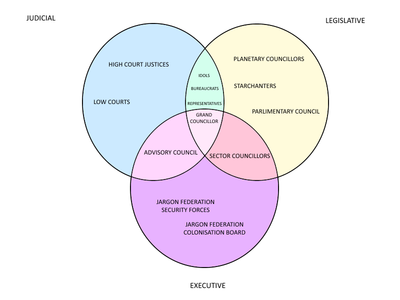Skrell Politics: Difference between revisions
Nralakk Federation |
m →Tupkala |
||
| Line 129: | Line 129: | ||
In '''2463''', after a series of diplomatic incidents caused by Tupkala operating outside their orders, for the first time in history the Tupkala were disbanded, following Grand Councilor Weashbi's condemnation. A few months later, Weashbi rebuilt them with Skrell he personally handpicked from the other branches of the Kala. The Tupkala are now under Commander Kezoq Torq-Bep, Weashbi's chosen Leader. Oddly enough, Commander Kezoq was promoted from the Sromkala, an unlikely place to find candidates for the Tups. | In '''2463''', after a series of diplomatic incidents caused by Tupkala operating outside their orders, for the first time in history the Tupkala were disbanded, following Grand Councilor Weashbi's condemnation. A few months later, Weashbi rebuilt them with Skrell he personally handpicked from the other branches of the Kala. The Tupkala are now under Commander Kezoq Torq-Bep, Weashbi's chosen Leader. Oddly enough, Commander Kezoq was promoted from the Sromkala, an unlikely place to find candidates for the Tups. | ||
```OOC Note: Characters that were former Tupkala are not allowed.``` | |||
= Espionage = | = Espionage = | ||
Revision as of 00:59, 5 November 2022
| Skrell Lore Pages | ||
|---|---|---|
| Skrell | Skrell Biology · Skrell Relationships · Notable Skrell | |
| Planets, Systems, Settlements | Qerrbalak · Qerr'Malic · Aliose · Aweiji · Tattuqig · Xrim · Diulszi · Skrell Abroad · Notable Skrell Systems and Locations · Generation Fleets · The Prescient Republic of the Qar | |
| Organizations, Factions, Politics | Nralakk Federation · Skrell Politics · Skrell Enforcement · Federation Crime and Resistance · C'thur in the Federation · Dionae in the Federation | |
| Culture, Society, History | Skrell Culture · Skrell Cinema and Idols · Skrell Education · Skrell Technology · Skrell Cuisine · Skrell History · Skrell Beliefs · Skrell Mythology | |
Politics
Government Structure

The Nralakk Federation has most of its power centred around the Federal Government, the central body that legislates and governs for the Federation as a whole which is led by the Grand Council. While the Federal Government oversees external relations as well as the overall governing of the Federation, the Sector Government oversees the regular day-to-day operations of a sector and its systems and planets, and is led by the Sector Councillor.
Positions within the Government follow a strict hierarchical structure, outlined below:
- Borough Councillor - This is the lowest and most local Government position recognised by the State. The definition varies, but boroughs are typically divisions of a town or city, with the number varying based on size. How the division is decided is based entirely on the local Mayor, with the Planetary Governor giving permission on the final proposal. The borough councils are set up in a triumvirate structure, and typically provide local services such as garbage collection and community event organisation. They are also responsible for cooperating with Federal Officials when it comes to auditing C'thurian hive-cells living in the borough or having local Diona prepare for their citizenship exam. Borough councils together form the local town or city council, where they make decisions that will affect the entire locality, rather than just their own borough.
- Magistrate - A Magistrate's role can be seen as similar to a Mayoral position. Their main responsibilities involve organising the local boroughs and providing guidance where required, as well as heading ceremonial duties and council meetings. Magistrates also act on behalf of their locality by forming the main council for the Regional Governor.
- Regional Governor - A Regional Governor oversees entire regions on a planet. Typically this is divided by continent, but can also be divided by island chains or other geographic lines. Regional Governors will provide the main administrative decision-making for their region, ensuring that the region they govern performs to an acceptable standard. Regional Governors answer to the Planetary Governor.
- Planetary Governor - The Planetary Governor oversees the administration of entire planets in a system. They follow the directives of the System Councillor, ensuring that a planet is productive and adheres to the Federation Standard for their Sector.
- Installation Directors - Installation Directors govern installations, which can vary from habitats or industrial facilities orbiting populated planets, to large structures in systems that are only exploited for their resources. As such, the position of this role in the hierarchy is entirely dependent on the facility itself; Directors of a facility orbiting a populated planet being considered Regional Governors, and Directors who run installations in systems with no colonies being given the same authority as Planetary Governors, with one Director being assigned the role of System Councillor by the Federal Government.
- System Councillor - System councillors administrate entire systems. They are responsible for ensuring that the planets in their system are providing their assigned portion of the system quota as outlined by their Sector Councillor, as well as ensuring that requests for Federal assistance in the form of funding, disaster relief, or other resources are sent through the proper channels.
- Sector Councillor - The six Sector Councillors govern one of the Sectors assigned to them by the Grand Councillor. They are responsible for ensuring that each sector is able to achieve the agenda as set out by Grand Council, which they are a part of.
- Xrim Consular - This is a unique role in that it's a governorship of a planet, but it answers directly to the Grand Council, making it technically the only Federal Position a Diona can hold. The Xrim Consul is a gestalt selected for their loyalty to the Federation, with their prime directive to manage the planet Xrim and its inhabitants, while taking measures to stop the proliferation of the worship of The First Consciousness.
Grand Council

Wuqrnjeq-Qu'Nralakk (Grand Council of the Nralakk Federation) is the supreme ruling body of the entirety of the Nralakk Federation. The Council will utilize subspace communication frequencies to delegate during non-essential meetings, however, are expected to return to Qerrbalak to attend an annual meeting held in Kal'lo. The Grand Council is renowned for their swift, and successful, response to the events that occur within the Federation, with support of the Council typically been incredibly high, but as the years continue, especially with the growing presence of The Resistance, has begun to dwindle.
History
First formed in 900 CE, after the unification of the Alliance, it was designed to oversee matters such as colonization, space exploration and to create a monolithic approach to society. Positions were quickly filled by those elected by their peers - with most coming from the precursor nations; the Heshyu Council, the Tzqul Republic, and the Weshqi Republic. The first iteration would see itself subsumed after the rise of Glorsh-Omega who deemed it unnecessary as the it could easily, and much more quickly, respond to any issues that would arise - even preventing issues entirely through the use of predictive algorithms.
After Glorsh-Omega had seemingly disappeared, it left the remnants of the Federation scrambling. It wasn't until 2310 CE, that the Grand Council was reinstated. The aims of such were exceptionally different from those that had guided the Skrell almost a millennia ago, with importance being placed on reintroducing the fragmented colonies back into the fold, reactivate the Nlom Relays disabled by the singularity caused by Glorsh-Omega and reestablish their dominance of the stars.
It wasn't until the Tresja Agreement that it was decided upon that a Head of State would be required, prompting the creation of the Grand Councillor title; a Skrell expected to lead the Federation into eras of prosperity, and ensure its continued existence. The very first Grand Councillor, elected due to their proposal on a blanket ban on any artificial intelligence within the borders of the Federation, was widely supported by almost all the Skrell across the Federation and has since been immortalised in Kal'lo Square where a memorial is dedicated to Grand Councillor Tiipis Yla has been erected.
Composition

The composition of the Grand Council is as follows:
- Grand Councillor:
The titleholder is expected to engage with the respective branches of the Federation: Executive, Judicial and Legislative. They are to utilize such to ensure sustainable development of all aspects in Skrell Society.
- Sector Councillors:
These are essentially the ‘Governors' of the six sectors throughout the Federation. They are expected to co-operate with the Grand Councillor, and relay information to and from the systems they oversee.
- Advisory Council:
The advisory council is comprised of Skrell that are selected by the Grand Councillor to provide advice when requested. Typically selected among idols that have made a profound impact in their respective fields.
- Public Sector:
The Public Sector is devised of Skrell important to the functioning of society; composed of Representatives, Idols and Bureaucrats.
Authority of Sector and Federal Government
The authority of Sector and Federal Government is kept separate to prevent overlap between authorities and to ensure efficiency. Federal law is absolute and supersedes sector law, meaning that in the event that there is conflict, the issue defaults to what the Federal law says on the matter.
Sectors can enact their own laws, but are limited to areas that do not concern the entire Federation; Federal crimes such as murder or money counterfeiting, immigration policy, and sentient rights laws are examples of what the Sectors are not allowed to legislate separate laws for. The Federation allows Sectors to amend certain laws however; while gun ownership in the Federation is Federally illegal, some Sectors in the Traverse that still have developing colonies have made it legal to own a personal firearm with ‘reasonable justification'. Sectors are also allowed to raise the maximum hours in a workweek if the Sector requires it to meet assigned production quotas, with the Federal maximum being 35 hours.
Law Enforcement Between Sectors
The Nlomkala is divided based on sector, with each subdivision answering to the main body based in the core systems. This division is strictly upheld in order to prevent corruption and bureaucratic errors when processing a criminal, making communication between divisions key in order to uphold the law.
In practice, this means that Nlomkala officers only work within their assigned sector and collaborate with other Nlomkala officers when criminals attempt to flee to a different Sector. Sector laws only apply to the Sector itself, meaning that while a criminal may be wanted for a sector crime, they are not in immediate danger of being caught until the Nlomkala put in a request to extradite them to the original Sectors Nlomkala division. Once a criminal is successfully extradited, they can be charged for their local crimes as well as have a Federal charge applied for fleeing the Sector, making their overall sentence much harsher.
Breaking local laws overall does not harm a citizens social credit as much compared to Federal laws. A citizen charged with breaking a sector law may see a small drop in their social credit score, but a Federal crime has the potential for the citizen to drop an entire point or even become a lower numerical.
Representatives
The Nralakk Federation employs several hundred individuals to fill ambassadorial positions between it and other foreign entities; known by many as merely Representatives. Each Representative is recognized by the Grand council as an individual who holds the Nralakk Federation's best interests at heart and has been entrusted to represent and protect these interests even outside of the Nralakk Federation.
Often, these individuals will study the society in which they are meant to act as an ambassadorial representative; mostly being that of culture and politics. This is expected to enhance the ability of the individual representing the Nralakk Federation. Representatives are considered highly influential in regards to politics outside of the Nralakk Federation; due to their handling of information, but also due to their loyalty. These Representatives are expected to claim an "Entity of Interest" -- an action which stands to present as the individual's primary field of expertise, and denote the foreign entity to which they devote their time to.
Representatives who share an "Entity of Interest" are expected to work together and cooperate to effectively protect the interests of the Nralakk Federation. Representatives that show a considerable aptitude when dealing with their respective "Entity of Interest" will typically remain aboard consistently, until recalled by the Grand Council. These individuals are highly versed in politics, and as such may result in fame arising due to their position; eventually achieving Idol-status. Representatives that achieve such a status will typically be under minute scrutiny by the Grand Council, with even the whisper of scandal resulting in their retraction as a Nralakk Federation Representative.
Schools of Thought
- Symbiosism: The more "mainstream" ideology within the Nralakk Federation; it follows closely the principles of welcoming the influence Humanity has within its borders, but also promoting the core ideals of the Skrell that have guided them for millennia. It is rather susceptible to change, and radicals are few and far between. Doctrines revolve around co-operation with other species and providing assistance to lesser nations within the Orion Spur.
- Isolationism: A growing ideology within the Nralakk Federation that has managed to gather a following, it dictates the need for Skrell to retract themselves from the affairs of the Orion Spur, only involving themselves if affected directly. It is resistant to change and aims to have the Nralakk Federation be entirely self-dependable. Doctrines revolve around the Pro-Skrell status quo. Radicals are common within this group.
- Progressivism: Typically, this ideology is often paired with other ideologies under the guise of "visionary radicals", it revolves around the pursuit of the Nralakk Federation pushing to be a dominion. It is only through the Nralakk Federation reclaiming themselves as the "Behemoth of the Orion Spur" will the Orion Spur truly find themselves in enlightened times. It has a heavy focus on the Nralakk Federation being economically, technologically, and militarily superior to all other nations within the Orion Spur. Radicals can be common, depending on the attached school of thought, or if followed singularly.
Federation Enforcement
Enforcers, or Kala, are responsible for upholding the law within the Nralakk Federation. Functioning in a strict hierarchy, the Kala are governed by a legislative body known as the Nralakk Federation Security Council. Formed in 901 CE as a means to unify all enforcement branches after the unification of the Alliance of the Three, the Kala were regarded one of the most important bodies of the Nralakk Federation, as Skrell who devote their lives to ensure the wellbeing of others and their society.
Their doctrines revolve around mobility, flexibility and precision. Whereas other units use a blunt approach, the Kala instead aim for the permanent neutralization of the situation - surgically striking to prevent it from growing out of control. Presently, the Kala maintain two core objectives. Firstly, ensuring the safety, security and cooperation of all systems under the Federation flag and protecting their borders. Secondly, reaching out to foreign communities outside their borders, be it within the Traverse or even the human Frontier. Representatives describe these operations as purely altruistic, aiding these communities both from a protection and economic point of view as part of the "Unity Initiative Project". One such example of these operations was the Nralakk Federation's involvement in the S'rend'marr Coalition. The Skrell civilians providing aid there suffered little casualties, with the advanced technology of their nlomkala protectors dissuading any ALA strikes.

Sromkala
"Prevent & Protect."
Sromkala, translating to Dream Enforcers, are Skrell selected to ensure that major planetary dreambubbles are safe from malicious lucidity. Agents are selected for their high psychic potential to oversee the Srom to ensure that no illegal or anti-Federation activities occur, particularly through the malicious use of Nlom-capable devices. They are commonly situated close to Nlom Relays - using the technology to amplify their capabilities tenfold. It is said that for every Nlom Relay across the Nralakk Federation, there is a Sromkala nestled within a special cryogenic pod that allows for their body to be in suspended animation, but allows their minds to project and continue working within Srom.

Nlomkala
"Service with Excellence."
Nlomkala, or Wake Enforcers, are often compared to police across alien space. The Nlomkala are expected to ensure the stability and safety of the Nralakk Federation at a physical level; mostly pertaining to simple duties such as patrolling, executing warrants and responding to emergencies relayed by the Ruupkala. There are extensive requisites to join the Nlomkala - ranging from athletic ability, understanding of the law and mandatory public relation classes to ensure that those selected to join can respond to situations correctly. Nlomkala are also expected to operate both on land and beneath the waves of the various planets across the Nralakk Federation.
Recently, the C'thur Hive has began to supply the Nlomkala with Vaurca Warriors to bolster the Nlomkala's forces. These Warriors are largely from Vytel's brood and have been loyalty implanted, making the Federation's orders equal to those of a Queen's. If the Warriors experience a conflict of interest, they enter hibernation until it's resolved. Thankfully, due to Vaurca adaptability, these Warriors function just as well underwater as above it.

Ruupkala
"Always Vigilant."
Ruupkala - or Intelligence Enforcers - are the Federation's official security intelligence agency, designed around the need to maintain Skrell harmony as unobtrusively as possible and ensure a safe position in galactic politics. While one of the most respected Kala, their agents are often characterised as the least martially inclined of the enforcement branches, owing in part to Federation media's efforts to present them as dedicated and principled data gatherers. Similarly, the agency's role is declared strictly as internal and focused on counterintelligence; public Federation figures often praise the Ruupkala non-interventionist policy and dismiss accusations of espionage as ignorant of Federation policy, or malicious. The only exception to their internal operations policy, Ruupkala also tend to keep tabs on the various Representatives throughout the Orion Spur, ensuring both their safety and that their work is satisfactory. Largely, this is accepted by most nations as the Ruupkala will only monitor the Representatives and not interfere with any diplomatic functions in any capacity.
The Ruupkala are rumored to monitor the fabled “Drylist”. This list supposedly holds the names of all Skrell living abroad who have performed deductive behaviors against the Nralakk Federation, displayed worrying ideals, joined an opposing faction, or renounced their citizenship. Some theorize that this list even covers non-Skrell who may pose a threat to the Federation.

Qukala
"Perpetually primed."
Qukala, or Star Enforcers, function as the Navy of the Nralakk Federation. Ranging from soldiers, to highly qualified personnel educated in engineering, or medical. Positions within the Qukala often require degrees from recognised universities across the Nralakk Federation, meaning in only very rare circumstances will undereducated candidates be considered for the Qukala. The Qukala is one of the most powerful Navies in the Spur, due to the Federation's old age and advanced technological level.
The Lukala was a branch of the Qukala once comprised of only Dionae and Vaurca, but as of 2463, the Directory of Defense Operations decided to dissolve the subbranch in favor in of integrating Dionae and Vaurca into the lower ranks of the Qukala as full members. This decision largely stemmed from the success the Lukala had in stopping insurgent activity in the Travese during the fallout of the recent Election. Furthermore, after striking a deal with the Grand Council, the C'thur Hive (namely Vytel's brood) have begun to supply a steady stream of new Warriors for the Qukala. These new Warriors have a Federation-designed Loyalty Implant that equalizes the Federation's orders to that of a Queen's. If a conflict of interest arises, the Warriors merely enter hibernation until the conflict is resolved.

Tupkala
"Courage, bravery and dedication."
Tupkala, usually shorted to Tup, are highly revered Skrell. Only those with a long, distinguished career are capable of being elevated to the position of a Tup; a position that encompasses increased security clearance - as well as minor Idol status. Tupkala are able to originate from all the other branches of the Kala, but are additionally trained and implanted to prevent any security breaches in the unlikely event that they are captured by enemies of the Nralakk Federation. These Skrell are commonly in their advanced age, with the mean being that of 276 years. When a Tup dies, their name will be added to the Tupkala Wall hosted in the Grand Councilor's Chamber on Kal'lo.
The Tupkala serve a variety of roles within the Federation. They dedicate Tups to the protection of prominent figures, black sites, and Special Operations. Oftentimes when the Federation needs something done quickly and quietly, the Tupkala are called to carry out the operation. Tups are rarely spotted outside the Federation, though that does not necessarily mean they are not present. Utilizing various Tupkala from the various different branches, Skrell who have pledged their unquestioning loyalty to the Nralakk Federation, aided by loyalty implants not different to the discontinued line released by NanoTrasen.
In 2463, after a series of diplomatic incidents caused by Tupkala operating outside their orders, for the first time in history the Tupkala were disbanded, following Grand Councilor Weashbi's condemnation. A few months later, Weashbi rebuilt them with Skrell he personally handpicked from the other branches of the Kala. The Tupkala are now under Commander Kezoq Torq-Bep, Weashbi's chosen Leader. Oddly enough, Commander Kezoq was promoted from the Sromkala, an unlikely place to find candidates for the Tups.
```OOC Note: Characters that were former Tupkala are not allowed.```
Espionage
The act of spying, and gaining confidential information, is a long-held tradition for the Skrell. Throughout their existence as a species, remaining in the shadows and deploying operations from afar, has managed to take hold instead of large scale warfare. Across the Orion Spur the species remain feared for their exceptional espionage skills, and even better counterintelligence capacities. Equipped with stealth capabilities, various advanced technologies at their disposal, and backed by the Nralakk Federation there is little that can stop the espionage agents distributed across the Spur.
Targets of Espionage
Specific agents will be tasked with different goals, and as such various categories have been developed in order to differentiate between the four categories; Bureaucracy, media, academia and militaries. Not all agents are designed to act in detriment of the state they observe, with some even implemented to ensure the success and growth; giving information back to the Nralakk Federation in order for the Grand Council to best determine which ways to intervene.
- Bureaucracy, the strategic identification and assessment of resources within a bureaucratic state. Usually implemented across the Nralakk Federation's territories, some have speculated that they have even dispatched some to other states across the Orion Spur. It has seen some victories, however, there are just as many defeats occurring across the traverse, with spies quickly sniffed out and imprisoned on various false charged by the planetary councillors.
- Media, the infiltration of the social network - be in locally or across the Orion spur. Usually subtle, employing the use of various journalists and postgraduate students to enact their plans on influencing social media to be more Nralakk Federation compliant. This includes censoring articles through methods that make it hard to access, or by flooding various social networks with pro-skrellian propaganda. It is unknown how successful these operations are, or how spread out they are.
- Academia, individuals placed to penetrate and invade the fields of research and education. One of the more elusive agents deployed by the Nralakk Federation, they are typically comprised of educators, scientists and even physicians, who are tasked with ensuring skrellian dominance over technology across the Orion Spur. It is assumed that these operations are quite successful, evident by the Skrell maintaining an advanced technological state compared to the lesser-nations it considers its neighbours.
- Militaries, is truly the most secretive and elusive field of skrellian espionage. Various techniques, and technologies, are used to gather information in regards to the military capabilities of a particular state. The Nralakk Federation dedicates a massive effort to this sector of espionage, with thousands of different methods implemented to ensure that skrellian agents can intervene and decapitate any opposing force that attempts to enact warfare on the Nralakk Federation. It is unknown how successful these operations are, or how deep it goes.
Technology and Techniques
The Nralakk Federation utilizes a variety of different technologies and techniques to ensure their dominance of espionage across the Orion Spur. Whilst most of their methods are aimed to be used within skrellian space, a few have been altered to be useful within the lesser nation-states. Depending on their placed categories agents may using steganography, clandestine concealment and stealth technologies, applied surveillance sciences, memory-erasers and sabotage.
The introduction of alien species into the Nralakk Federation, with unique biological and evolutionary advantages, the Skrell have managed to modernise their espionage tactics, doubling their effectiveness. These alien agents will undergo a variety of different treatments to ensure their loyalty to the Nralakk Federation, with some even being implanted with loyalty implants to ensure it.
In recent times, the Nralakk Federation has been accused of altering their agents' appearance to infiltrate governmental positions; posing as other species. Whilst they claim that is it ludicrous; rumours continue to perpetuate that the combination of both skrellian and vaurcan technology and techniques, it is a genuine possibility that they may have managed to crack the secrets of mass genome tampering.
Relations
Relations with Foreign States
Solarian Alliance
The Solarian Alliance sees the Nralakk Federation as their closest ally within the Orion Spur, both economically and as a force to help preserve the status quo if anything seriously threatening galactic stability or if an unrecoverable disruption of the balance of power had to occur. Whilst there are whispers of many that fear the potential growth of the Nralakk Federation into the wildlands that the Solarian Alliance still seeks to return to the fold, their relationship has continued to prosper even after the turbulent events that nearly brought the Orion Spur to its knees.
The Solarian Alliance has the most Representatives of the Nralakk Federation within its borders, who typically work alongside one another to maintain the relationship between both nations. The recent events that have resulted in the shrinking of the Solarian Alliance has prompted additional Representatives working within its borders; seeking further avenues in which the Nralakk Federation can expand their influence within the Solarian Alliance. The Solarian Alliance and Nralakk Federation have several agreements; mostly related to trade, research, and migration.
Republic of Biesel
In most official capacities, the Republic of Biesel maintains positive relations with the Nralakk Federation to the beneficial trade that occurs between the both of them. Politically, it is mostly the same, however there is a growing number within the Republic that have begun to view the Nralakk Federation as untrustworthy due to their lack of intervention during both invasions of Tau Ceti. Tau Ceti is one of few places outside of the Nralakk Federation that is considered worthy of visiting by Skrell; resulting in an increased demand for visas (tourist and work) for Tau Ceti.
The Republic of Biesel, at any given time, has roughly the second-largest amount of Representatives of the Nralakk Federation within its borders. Following the events that nearly crippled the Orion Spur, the Nralakk Federation has begun searching for another way to increase their influence within the fledgeling republic; mostly through the use of foreign aid, and restricted technological exchanges. The Republic of Biesel has expressed interest in increased diplomatic ties with the Nralakk Federation; mostly involving concessions for Megacorporations to be able to freely operate within the political entity. The Nralakk Federation has affirmed that they see the Republic of Biesel as a valuable diplomatic partner, and publically wishes to increase diplomatic ties with them.
Coalition of Colonies
The Coalition of Colonies is somewhat public about their opinion of the Nralakk Federation; stating that they are suspicious of the foreign policy boosted by the nation, alongside its authoritarian system. They also view the Nralakk Federation as Sol-aligned, and therefore anti-Coalition of Colonies by association. Whilst there are talks about economical cooperation, however, both the Coalition of Colonies and the Nralakk Federation would be able to produce large quantities of wealth off of one another.
The Coalition of Colonies sports a few dozen Representatives of the Nralakk Federation within its borders, mostly tasked with improving the relations between the two behemoths. The inaction of the NralakkFederation in the Second Invasion of Tau Ceti has resulted in quite a stir within the Coalition; many citing that the Nralakk Federation is no longer pro-Sol, with others perpetuating rumours that they simply bide their time and will soon be launching an attack on the Orion Spur. The Nralakk Federation has publically announced an interest in exploring additional diplomatic avenues with the Coalition of Colonies; however, little effort has been seen in regards to this.
Empire of Dominia
Thee Empire of Dominia maintains a public ambivalent relations with the Nralakk Federation; politically and economically. Hardly any effort is exerted in regards to the Nralakk Federation officially, with some more liberal merchant factions rooted within proposing trade with the Skrell. Unofficially, the Empire of Dominia is split ideologically in regards to the political entity. Many both like that the Nralakk Federation has taken steps in restricting artificial intelligence, but there is also a sizeable that hates them for being the first ones to create it.
The Empire of Dominia maintains only six Representatives of the Nralakk Federation within its borders, focusing on creating opportunities for trading, with little success. The inaction of both the Nralakk Federation and the Empire of Dominia during the latest turbulent events of the Orion Spur has resulted in the warming of relations somewhat. The Nralakk Federation has displayed minor interest in exploring the relationship between the two entities but has yet to engage in such diplomacy.
Serene Republic of Elyra
The Serene Republic of Elyra has publically maintained that they are suspicious of Federation encroachment, as well as interference in human affairs, in lieu of the Solarian Alliance's collapse - despite this, they continue cordial if a bit distant relations with the Nralakkn Federation. There are whispers that many within Elyra see the Nralakk Federation as an ally against the Lii'dra should they return. They are economically disinterested in the Nralakk Federation, as the Serene Republic of Elyra has continued their self-sufficiency since the collapse of the Solarian Alliance, and the trade that the nation does conduct are mostly done with the Coalition of Colonies and the Republic of Biesel.
The Serene Republic of Elyra has roughly two dozen Representatives of the Nralakk Federation within its borders, with a focus on technological cooperation. The inaction of the Nralakk Federation during the recent events that haunted the Orion Spur has resulted in relations between the two technological giants to become somewhat cold, with a large migration of Representatives back to the Nralakk Federation. The Nralakk Federation publically supports a minor interest in exploring a relationship with the Serene Republic of Elyra, a technological one, that is.
Eridani Corporate Federation
The Eridani Corporate Federation has made the Orion Spur very aware of their interest to pursue additional economic cooperation with the Nralakk Federation; citing that it is a massive market for Zeng Hu Pharmaceuticals, and Megacorporations found within the Board of Five. The closeness of the Nralakk Federation and the Solarian Alliance has resulted in cordial relations between these two federations, with a significant amount of both the entities wealth being invested into one another.
The Eridani Corporate Federation maintains the third largest following of Representatives of the Nralakk Federation within its borders, with most focusing on exploring additional economic cooperative avenues that will enhance the wealth of both. The inaction of the Nralakk Federation during the Second Invasion of Tau Ceti has resulted in somewhat weakened relations; however, the Eridani Corporate Federation publically maintains that the Nralakk Federation is a crucial member of its economy. The Nralakk Federation has all but ensured that the Eridani Corporate Federation will soon benefit from proposed deregulation of the skrellian economy.
People's Republic of Adhomai
The People's Republic of Adhomai attempts to secure a respectful, diplomatic relationship with the Nralakk Federation; mostly in part due to its policy of approaching alien powers for support in the Adhomian Cold War. The People's Republic of Adhomai has essentially pushed for cordial relations between them and the Nralakk Federation resulting in increased cooperatives, mostly involving the "Project Unity Initiative" - a diplomatic agreement in which the Nralakk Federation commences humanitarian aid projects and provides monetary assistance.
The People's Republic of Adhomai has roughly three dozen Representatives of the Nralakk Federation within its borders, mostly focusing on administrating the "Project Unity Initiative" and facilitating diplomacy between the three warring nations on Adhomai. The inaction of the Nralakk Federation during the recent Solarian Invasion of Tau Ceti and resulting collapse that turned the Orion Spur on its head has not had an impact on the relationship between the Nralakk Federation and the People's Republic of Adhomai. The Nralakkn Federation recently broke it's stance of neutrality in regards to Adhomai. After an attempted terror attack on District 8 in Biesel's Mendell City by radical Al'mariist insurgents, the Federation officially recognized the People's Republic of Adhomai as the sole civil authority of the planet and began to support their claims politically. It's unknown to the public if the Federation is offering more material support behind the scenes due to both nations' private nature.
Democratic People's Republic of Adhomai
The Democratic People's Republic of Adhomai has little to no relations with the Nralakk Federation; mostly due to the xenophobic nature of Al'mariism. The Nralakk Federation is viewed by many within the Democratic People's Republic of Adhomai's borders as a threat to their independence and future; which usually devolves into accusations of imperialism by various prominent politicians. Even the most progressive of Al'mariists maintain the dislike of the Nralakk Federation.
Due to the recent attempted terror attack in Mendell City, relations between the two political bodies dipped to the worst in history. The Federation took the planned bombing of District 8 as an unfettered act of aggression against Skrell. While the Federation had always believed the Democratic People's Republic a threat to Adhomai, they now hold the position that Al'marrists are a threat to the greater Spur aboard as well.
New Kingdom of Adhomai
The New Kingdom of Adhomai, due to its precarious position, maintains an official intention of establishing positive diplomatic ties with the Nralakk Federation; mostly in hopes of establishing the "Project Unity Initiative" within its borders. The turbulent history of Adhomai has resulted in somewhat lukewarm relations between the New Kingdom of Adhomai and the Nralakk Federation, however, what relations that did exist were irrevocably obliterated when the Federation announced their political recognition of the People's Republic of Adhomai as the sole civil authority of the planet.
Despite the incident that caused this change in the Federation's political stance being caused by Al'mariists, the Federation has been unyielding in political channels to reverse this decision, to the woe of those in the Kingdom who had hoped to benefit from the Project Unity Initiative. The Federation retracted all political ties with the New Kingdom of Adhomai, and declared the state illegitimate.
Izweski Hegemony
The relationship between the nations of Skrell and Unathi has been rocky, to say the least. Following their introduction to the intergalactic stage and subsequent Contact War, the rule of Hegemon S'kresti caused relations to sour. The conflict on Ouerea as well as the handling of the Defiled Lands and various accusations made by both sides, proven or otherwise, only continues to mar recent history. It is only with the death of the last Hegemon and the official coronation of Not'zar Izweski where the situation is beginning to look hopeful for relations.
The stifling silence between them is seen to be either a growing tension between two groups on the cusp of change, or merely an awkward pause before reconciliation, reparation, and realignment. Though they lack embassies in their respective territories, the Skrell assert responsibility and interest in the development in Ouerea as it becomes a cultural hotbed and merger of ideas and innovation, and as such talks between the two groups is inevitable. Furthermore, Skrell and Unathi delegations have been openly suggesting diplomacy; though facing backlash from bitter traditionalists and more conservative Unathi in the Hegemony, it is clear some amount of change is on the horizon, for better or for worse.
The Co-operative Territories of Epsilon Ursea Minoris
The Nralakk Federation and CT-EUM have close ties, with the Federation playing a large part in the formation of the planets primary Government. The Federation has a permanent embassy in the city of Nral'Daaq on the planet, which is also the location of the majority of Skrell that live here. The Nralakk Federation has long-established trade and migration agreements with CT-EUM, with the latter allowing for a somewhat easier citizenship process for Dionae originating from Epsilon Ursea Minoris, and the former allowing EUM to export goods to the Nralakk Federation on a barter basis similar to their local economy.
Whilst CT-EUM is independent, the planet is close to the Nralakk Federations borders, and the city-state of Nral'Daaq has a sizeable population of citizens from the Nralakk Federation. Officially, the Nralakk Federation stays out of the CT-EUM's affairs, but observers have pointed out CT-EUMs involvement in crackdowns on anti-Federation sentiment within its borders.







